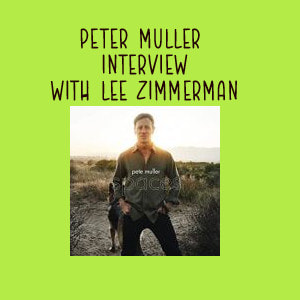|
The Breadcrumbs Widget will appear here on the live site.
7/30/2022 Peter Muller Interview With Lee Zimmerman
For Pete Muller, Music, Math and Business Acumen Allow for a Creative Combination (by Lee Zimmerman)
Singer, songwriter, and piano player Pete Muller may be the best singer/songwriter than the world has yet to discover. Five albums on, his music conveys intelligence, insight, and emotion in equal measure, a combination that is as compelling as it is creative. That’s evident yet again on his exceptional new album, Spaces, a set of songs that takes an introspective view through musings and meditation but still connects with its listeners through its alluring melodies and decidedly determined messaging. Songs such as “Tin Palace”, “Light Up the Night”, “The Other Side”, “Gone”, and “Last and Lonely” share an instant appeal and effortlessly engage, yet also reflect a craft and technique that’s easily the equal of any artist of greater renown. Suffice it to say, Muller well deserves to be on the same plateau in terms of both recognition and respect. There is no single song here that doesn’t fail to instantly impress. If that wasn’t enough, Muller’s instincts and intelligence extend to other realms as well. He’s worked on Wall Street, built a reputation as a master of mathematics, and crafted crossword puzzles for the New York Times and Washington Post. A renaissance man by an exacting definition, he’s also amiable and engaging, as his conversation makes clear. ‘I do everything I do because I'm passionate about it’ he says, speaking on the phone from his home in Santa Barbara, California. ‘I think the secret for me doing well for myself is me waking up every day and being excited about what I'm doing that day, whatever it is. I'm lucky that, you know, I've found a bunch of things that really excite me and give me energy’. That desire to succeed has spurred him since early on. As a college student, he befriended a budding Olympic gymnast who asked him to compose some music for her that she could use in competition. It helped inspire her to the point where she came in fourth in her Olympic trials. ‘The rules were a little strange’ Muller recalls. ‘You could only have one instrument accompanying you. And a lot of most people picked piano. So, she told me one day, ‘I'm really bored with all my pieces. Would you want to write one for me?’ And so, I wrote her one and she listened to it. Then she said ‘ah, I don't know, but I'll give it a try.’ And then she came back a week later, and she said every time she listened to it, she got better, and she never had a piece like that. She said, ‘You have to come play for me’. So, I said, okay’. Even while Pete Muller became temporarily sidetracked by his investment efforts later on, music remained a major focus. ‘I’ve always really wanted to do music, and I've always done music’ he insists. ‘I had a band for most of my life. But I went through a really tough breakup, and that's when I started writing songs, as opposed to just being a piano player. The first songs I wrote were like Patty Griffin's first record, which is one of my favorites. It dealt with living with ghosts, talking about heartbreak. It took me a while to get to that level of emotional expression that connects with other people, but that's what got me into it. And then I kind of never stopped writing and playing’. Nevertheless, with a new relationship that led to marriage and domestic responsibility, Muller did in fact make music secondary for a brief time. ‘I put a couple of albums out when I first started, got involved in songwriter circles, worked on my game, and left my group mostly behind’ he reflects. ‘And then, in the mid-2000’s, I met the woman who became my wife and we had a couple kids and I went back to making sure that my business was okay. But I didn't put the music aside entirely. I kept performing, what I kind of did was stop writing. And then back in 2014, I went back. I had a backlog of songs, and that's when I started my third record. I realized, that I really wanted to get serious about this. The question was, what do I do? How do I keep going? And then the fourth record came out in 2018. And now there’s Spaces, which just came out’. Pete Muller still oversees his investment firm, but says he leaves he day-to-day operations to his team. ‘I can be the spiritual leader, and occasional deep insight provider, but they do most of the hard work’ Muller maintains. ‘I'm passionate about both music and math, that's kind of been the mantra — music and math. music and math. My brain doesn't stop working in a creative way. I love creating’. It may seem surprising to some to find a common core between the music and the math, but Muller insists that they do possess a common denominator, ‘The core of any good song, in my opinion, is a strong emotion that you want to convey’ he explains. ‘And that typically has nothing to do with math. It only has to do with feeling and spirit and what's going on. That's kind of the visceral core of that. And that might actually come out fully formed as a melody or a lyric, or a whole chorus that says something, because otherwise, there's no reason to write. Otherwise, it's kind of an intellectual exercise. It has to be about how to take that emotion, and then convey it to a listener in a way that resonates with them. That's where the math part comes out in the structure. What kind of a rhyme scheme do I want? How many verses do I want? How do I reveal what I’m trying to say? It’s completely emotionally driven. The calculation is about examining choices. So, when you look at the choices, the way you decide if it works or not is that you feel it. I guess it's about opening doors that one might not suspect initially, just by being able to delve a little deeper, and to try to follow up on what you’re trying to convey. Mathematics is a tool. It's a tool that helps you do something. It's part of the process, but it's not the total focus’. That said, Muller admits that his career continues to be a work in process. ‘I'm still on the learning curve’, he allows. ‘When I put the first record out, I had this arrogance, or maybe it was just like confidence. It was like, what do I really need a producer for? I'll just record this in my apartment with me singing on piano with a good recording engineer. And people told me, you know, Pete, that's a dumb idea. Don't do it. I did it anyway, that was how the first record was recorded. A lot of people do that the way, DIY’. Nevertheless, he says that as his music career progressed, he decided to do things differently. ‘I think I could have definitely benefited more from a producer, who could really try to rein in the songs and the songwriting and help shape them in a coherent way’ Muller concedes. ‘I think that was my biggest struggle early on. With the second record, I felt like I addressed that a lot in terms of the songwriting. The third record was really about becoming more of a vocalist. I'd always been a piano player, so I hadn't really worked on my voice. And for that third record, and especially with the fourth and now the fifth record, I really worked on my singing. I had a great voice teacher, a woman named Valerie Morehouse, who really got me to be super comfortable singing in the studio and singing live and just helped me a lot. Also, for the last two records, I was lucky enough to work with Rob Mathes, who is an amazing producer. He's worked with Sting, as well as countless other people and he would challenge me on my lyrics, on song structure, on chord voicings, just in the course of sitting down with him. And just listening to him critique the songs, it was so revelatory. In some of them, he was just like, wow, this is great. You're done. And with some of them he was like, okay, there's something missing here. What if you cut out this verse and these chords r over here, and I was like, oh, wow, how did I not see that? It was just pushing me in a way that was phenomenal. And that's been incredibly helpful. And so, getting that feedback and being able to take constructive criticisms been so helpful. I love that process’. To that end, he’s engaged in outreach that has not only underscored his efforts, but helped others as well. He hoped fund the renovation of the iconic recording studio, the Power Station, where he recorded the new album with his touring band, The Kindred Souls. ‘We saved the studio’ Muller muses, ‘and now I have my own little studio up top. So, it worked out great’. In addition, Pete Muller was a co-founder of the non-profit Live Music Society in order to provide no-strings-attached grants to independent music venues around the country. ‘They're actually graduating the first master’s class that they had this year’ Muller notes. ‘I told them that I would go in and be part of the ceremony, which I'm kind of regretting because it's a beautiful weekend here. I don't know that I want to be in New York City. That said, I’m really proud of that they've done. For me, it’s purely philanthropic. Everything that I do in music in terms of any money that I make, I give away to the arts and for music. The band does fine when we’re out on tour, but for me, it's about giving it away, I’m lucky enough to have found a way to do something that I'm passionate about, and which makes enough money for my family and for anything I need. So, I can do music for the for the pure joy of it’.(from the album Spaces available on Two Truths Music) Listen and buy the music of Pete Muller from AMAZON For more information and purchase options, please visit Pete Muller website Spotify EMBED: <iframe style="border-radius:12px" src="https://open.spotify.com/embed/album/4RZIrXVjiioRefU5QeeYDv?utm_source=generator" width="100%" height="380" frameBorder="0" allowfullscreen="" allow="autoplay; clipboard-write; encrypted-media; fullscreen; picture-in-picture"></iframe> The Blog Tags widget will appear here on the published site.
Tags:
0 Comments
The Recommended Posts widget will appear here on the published site.
Leave a Reply. |
- Home
- Top Ten
- It's All Music Radio
- Latest Videos
- All Reviews
- Breaking Thru
- Who's Playing Near Me?
- Seen & Heard
- About
- Contact
The Category Navigation Widget will appear here on the live site.
|
To submit music, please mail a copy of your CD to the following address:
Danny McCloskey The Alternate Root 1717 East Vista Chino Ste A7 PMB 302 Palm Springs, CA 92262 |
Contact Us |
©2021 The Alternate Root All Rights Reserved
website by Jim Cortez [email protected]
website by Jim Cortez [email protected]


